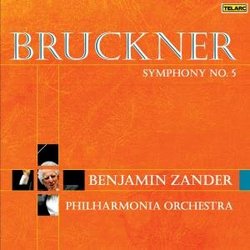| All Artists: Bruckner, Pao, Zander Title: Symphony No 5 Members Wishing: 0 Total Copies: 0 Label: Telarc Original Release Date: 1/1/2009 Re-Release Date: 3/24/2009 Album Type: Hybrid SACD - DSD Genres: Special Interest, Classical Style: Symphonies Number of Discs: 1 SwapaCD Credits: 1 UPC: 089408070662 |
Search - Bruckner, Pao, Zander :: Symphony No 5
CD Details |
CD ReviewsAnother Stellar Recording from Zander and Telarc Nicholas Scratch | Columbia MD | 04/04/2009 (5 out of 5 stars) "Benjamin Zander takes a break from the Mahler cycle to record Bruckner's 5th. Here we get another stellar recording from Zander and Telarc as well as the bonus disc featuring a discussion of the piece. Zander's talking points are always insightful but in this instance I found them particularly helpful as the Bruckner 5th is a piece that I'd never quite warmed up to until now. He likens the structure of the symphony to the structure of a cathedral and even includes a blueprint (!) as an insert along with the booklet. I certainly never looked at the piece quite like that. I'm happy to say I'm appreciating the 5th more and more with each listen. Whether you are a fan of Bruckner or are new to his music I highly recommend this 2 CD set." Finally The Fifth! Aaron Z. Snyder | CHESTNUT HILL, MA USA | 05/19/2009 (5 out of 5 stars) "My own disclosure: I've been a fan of Ben Zander since 1977 and a friend since about 1985. That doesn't mean that I've given automatic approval to everything he has done; that is, I think that I am capable of giving an unbiased view here. If I felt otherwise, I'd keep my thoughts to myself. (Oh, by the way, I know Brian Bell, too.) I have always felt that the Bruckner 5th, which was once characterized by David Hall in HiFi/Stereo Review as being "For Brucknerphiles Only," is the most nearly-perfectly structured symphony in the entire catalogue of symphonies in general. The fact that the work is also emotionally satisfying (actually, at times, quite thrilling)should mean that this symphony should have a much wider fan base than it actually has. The fact that so few people claim even to like anything by Bruckner is due, in my opinion, to poor performances by conductors who should know better. There is nothing ponderous about Bruckner's music; it's the interpretations which often are ponderous. Benjamin Zander, despite his interest in the work, was extremely reluctant to perform the Bruckner 5th probably more because of its reputation rather than because of the difficulty of the work itself. William Carragan, whose work on the finale of the Bruckner 9th Symphony and whose preparation of the definitive study of the 2nd Symphony are well-known among Brucknerites, has been studying tempi and tempo relationships in Bruckner Symphonies for many years and was able to contribute his valuable service to Zander in preparation of this performance. The net result of all of this preparation is the most nearly-perfect recorded performance of the Bruckner 5th that you will ever have a chance to hear. No, this is not a performance which is note-perfect and tempo-perfect, but devoid of the human element which makes a performance sound alive. The performance breathes and excites. It's definitely *not* just for Brucknerphiles. " Noteworthy D. Mills | Silly Valley, CA | 05/17/2009 (5 out of 5 stars) "I have been listening to Bruckner for 30 years, and I'm an unabashed admirer of this symphony. It shows the composer at the peak of his form, not only for the contrapuntal richness, but mainly for its progressive cumulative impact. (Bruckner had a serious 'finale problem' that was only completely solved in the 5th and 8th symphonies).
Despite the strengths of its musical argument, it takes a special outlook in order to bring it off. If I had to sum it up, it's a matter of resisting the temptation to stop and mold the granite that makes up this musical cathedral. Notable conductors, some with Brucknerian credentials (Karajan, Jochum, Celibidache and Chailly) have failed to fully catch fire. It's the handling of the transitions that is key here. Gunther Wand, Michael Gielen and Franz Welser-Most have come closer to bringing this off by bringing a sense of purpose from first note to last. Even the ever-unpredicatable Giuseppe Sinopoli rose to the occasion with one of his greatest performances. I'm happy to add Benjamin Zander to this list. He extracts beautiful playing from the orchestra, without engaging in needless 'ritardando' moments. Tempi are as fast as one probably wants (Welser-Most pulls off a similar approach until the last movement, where he enters a rush to climax that seems too steroidal for the material). What pushed this package into 5-star territory for me was the second disk, filled with an engaging and insightful commentary by the conductor, who leads the listener through the symphony and illustrating the major aspects of its thematic and tonal structure by presenting the material on the piano. Telarc engineers masterfully weave Zander's illustrations into the relevant orchestral excerpts. Highly recommended, no matter how many Bruckner Fifths you already own. " |

